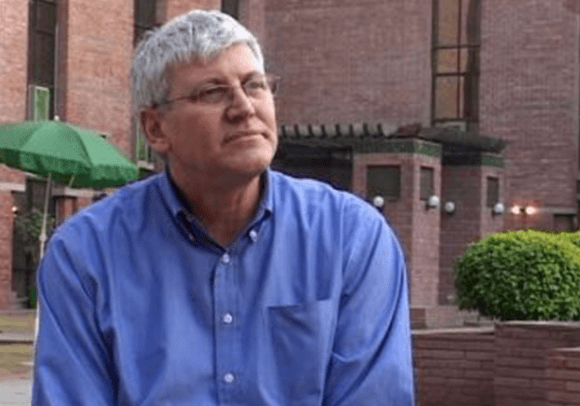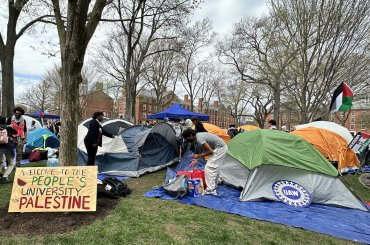On October 13, 2014, an Israeli history professor at Fordham University, Doron Ben-Atar, went public with the claim that he had been the victim of “a politically-motivated witch hunt” after speaking up against the boycott of Israeli academic institutions voted in 2013 by the American Studies Association. The boycott, he said, represented “anti-Semitic bigotry.” For months Fordham had been investigating him without specifying why. It had tried to intimidate him with what turned out to be counter-charges of “religious discrimination.” What an irony, he concluded, that “fighting against the oldest hatred–anti-Semitism–makes one a pariah.” He mentioned Kafka.
Any reference to anti-Semitism will get attention, and rightly so. No one has forgotten the Holocaust, least of all we Jews. The Kafkaesque story of a lonely individual persecuted by a faceless, secretive institution also had its own attractions, and this story was even spicier because the bureaucratic machinery Ben-Atar claimed was victimizing him had been put in place to protect victims of racial and sexual discrimination. A flurry of angry articles followed in the New York press and online, most of them more or less accepting Ben-Atar’s travesty-of-justice account at face value. One used the word “inquisition.”
If you peek beneath the surface, however, the story looks a bit different.
Like many other university presidents, the president of Fordham condemned the 2013 boycott resolution. But Ben-Atar wanted more. He began sending emails to the 50-odd faculty members of Fordham’s American Studies program demanding that the Fordham program withdraw from the national association in protest. Ordinarily such a decision would be taken by the executive board, but in deference to Ben-Atar an extraordinary meeting was convened on February 24, 2014 to discuss his proposal. Accounts of the meeting (whose minutes are available) describe it as scrupulously democratic, thoughtful, and even moving, with divergent views of the boycott expressed and all of them listened to respectfully. At the end, there was neither consensus for or against the boycott nor a majority in favor of the proposed withdrawal from the national association. Even those against the boycott were not in the main in favor of withdrawal. It was at this point that Professor Ben-Atar vowed to continue fighting the program “in every way.”
Here we see an inaccuracy in Ben-Atar’s account, though perhaps only a minor one. His article asserts that he was initially judged in possible violation of the university’s code of civility because he declared “I would quit the American Studies program should it not distance itself from anti-Semitism.” In fact, the code in question forbids “engaging in, or inciting others to engage in, conduct which interferes or disrupts any University function.” In other words, the violation that was investigated had to do with his threat to fight the program itself, not with his threat to quit.
This may seem too trivial a matter to justify disciplinary action. (As it happens, Fordham decided in July that no disciplinary action was called for.) The same might be said of his many unwanted emails, badgering colleagues to stand up for his position. Who has not encountered a co-worker (often of a certain age) who has a weakness for the late-night digital rant? If the bar for verbal harassment were placed so low, what office would escape unending litigation?
The real issue here is anti-Semitism: that is, accusing people of it.
It seems Kafkaesque to Ben-Atar that he should be a victim when all he has done is stand up for the victims. But to call someone an anti-Semite is a very serious charge. It is an accusation that can produce a great deal of personal unhappiness, destroying friendships and careers. No one has the right to make such a charge lightly or irresponsibly. Whether or not it counts as harassment in a court of law, anyone falsely accused of anti-Semitism has a non-negligible claim to have been victimized. So there really is reason to ask: who is persecuting whom?
According to figures at Fordham who were closely involved, Ben-Atar circulated emails to faculty members he assumed to be Christians, suggesting that Jews were resigning in protest against anti-Semitism and that it would be bad if a split developed between Jews and non-Jews. One of his colleagues, who preferred not to be named, was deeply offended by this sniffing into religious origins and explained: “I have never been asked to declare that I am not an anti-Semite.”
There is of course a difference between calling people anti-Semites to their face, on the one hand, and on the other following a line of argument that leaves them no alternative except to admit that, should they disagree, the only explanation for their disagreement would be that they are anti-Semites. But the line is not nearly clear-cut enough. Especially not when mere insinuation will result in floods of extremely disturbing hate mail, as has happened here.
According to various sources, Ben-Atar’s emails freely suggested that anyone who did not object to the boycott and therefore call for Fordham’s withdrawal from the national association was participating in a long tradition of “Jew hatred.” His argument left no other option. The American Studies Association resolution is anti-Semitic, so if you do not agree to withdraw from the American Studies Association, you too are anti-Semitic. No further evidence of your prejudice is required. Anyone who isn’t with me on this is an anti-Semite.
In his article, Ben-Atar claims to possess professional competence on the issue of anti-Semitism. It is true that he has published on the subject. But the suggestion that any criticism of Israel can only be anti-Semitic casts some doubt on his scholarly acumen. And even if he had all the acumen in the world, he would not have the right to decide who is and who is not an anti-Semite. We all remember the bad habits of the McCarthy period, when so many lost their jobs and even their liberty over sly and often baseless innuendoes. Today jobs are again being lost to a sense of aggrievedness that is not always carefully inspected for its accuracy.
Consider the fate of Steven Salaita and the Reverend Bruce Shipman. Their victimhood is not open to doubt. Real victims like them suffer every time someone cries victim when nothing has been done to them.
The fear of even appearing to tolerate anti-Semitism is so great that institutions will not always stop and check to see whether the particular grievances have any justification whatsoever. There are too many irresponsible charges of anti-Semitism out there, blackening the names of individuals and institutions as well as shutting down legitimate and much-needed debate about Israeli policies.
There has been no evidence of anti-Semitism at Fordham. People should not have to walk the corridors of that distinguished institution in fear of being falsely accused.



Anti-Semitism in Paris, that was quick:
January 2, 2015 8:19am Israel: ‘Deep disappointment’ in France’s U.N. vote on Palestine, JTA
January 7, 2015 8:45am At least 12 killed in attack on French satirical [Anti-Muslim ] magazine,JTA
Tactics suggest overseas Jihadi training in Paris newspaper shooting
From photos and videos of the attack it appears that the gunmen were trained, from the way they handled their weapons, moved and shot. This raises the possibility that they had received training in using light arms (perhaps at a jihadist camp overseas) or had fought with jihadists overseas….[Fluent French speakers ] One of the attackers was alleged to have shouted out, “You tell the media it was al Qaeda in Yemen” during the assault, Britain’s Channel 4 News reported., Stratfor
http://www.kvue.com/story/news/world/stratfor/2015/01/07/tactics-suggest-overseas-jihadi-training-in-paris-newspaper-shooting/21388249/
Tremendous article, Bruce. Thank you for exposing Doron Ben-Atar and his terrible crusade. I was not aware of any of this.
“Consider the fate of Steven Salaita and the Reverend Bruce Shipman. Their victimhood is not open to doubt. Real victims like them suffer every time someone cries victim when nothing has been done to them.
The fear of even appearing to tolerate anti-Semitism is so great that institutions will not always stop and check to see whether the particular grievances have any justification whatsoever. There are too many irresponsible charges of anti-Semitism out there, blackening the names of individuals and institutions as well as shutting down legitimate and much-needed debate about Israeli policies.”
You, of course, hit the nail on the head. I would think that Ben- Atar should face some sort of consequences for what he has done.
>> And even if he had all the acumen in the world, he would not have the right to decide who is and who is not an anti-Semite.
Of course not – that’s hophmi’s job! ;-)
“But to call someone an anti-Semite is a very serious charge. It is an accusation that can produce a great deal of personal unhappiness, destroying friendships and careers. No one has the right to make such a charge lightly or irresponsibly.”
Exactly. And so we learn, and should teach, that there is a world of difference between saying that “I feel that I am being the victim of antisemitism” (an “I feel” message) and saying “I am the victim of the antisemitism of X” (an accusation against X). It is easy to sympathize with someone who feels bad, even if inexplicably, but also easy to feel angry about someone who accuses people inexplicably.
fantastic article bruce, thank you.